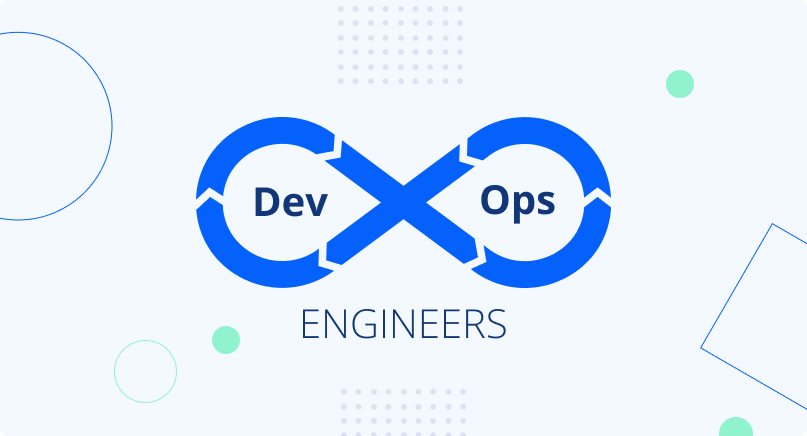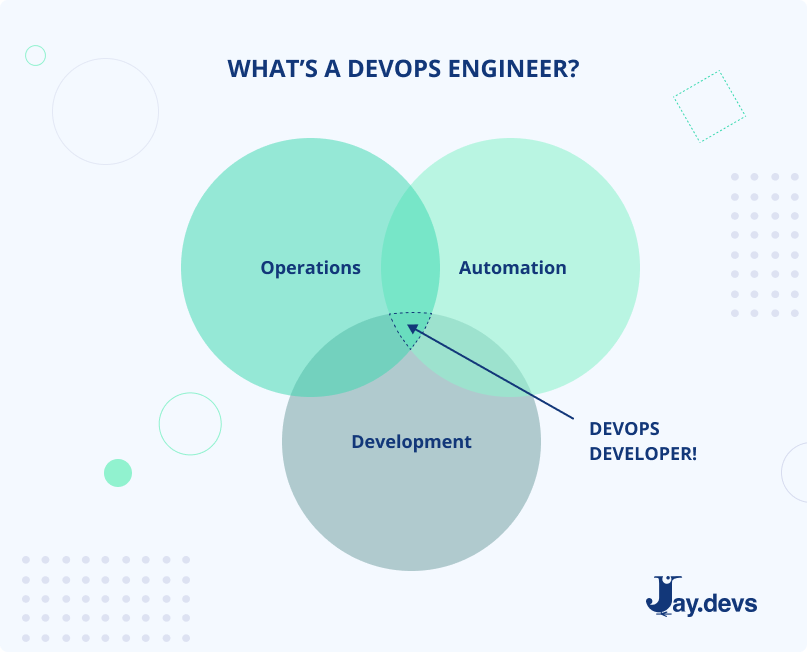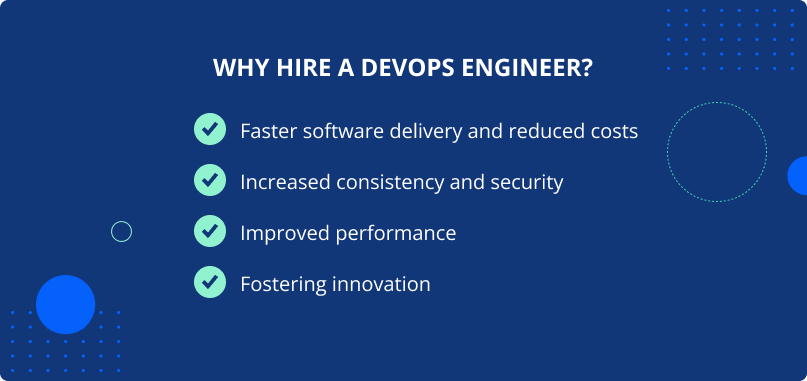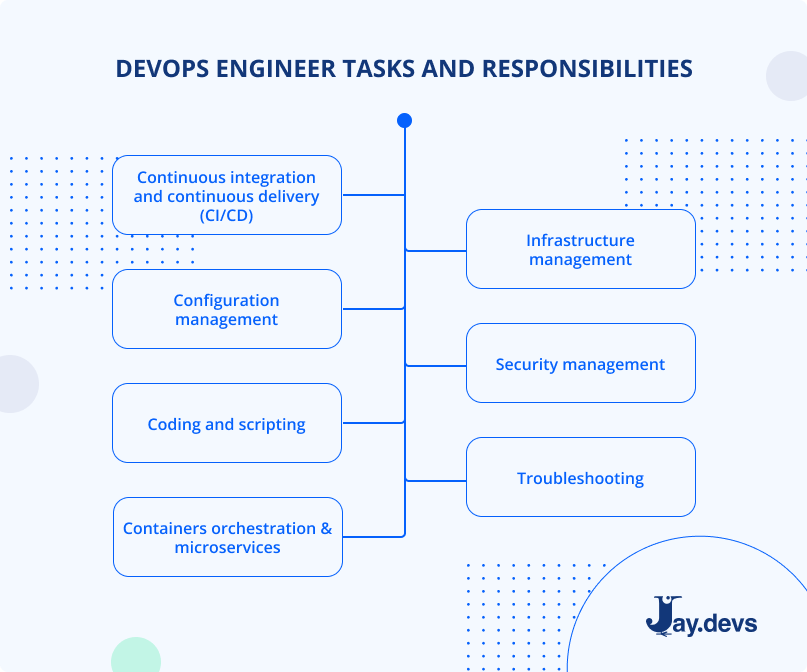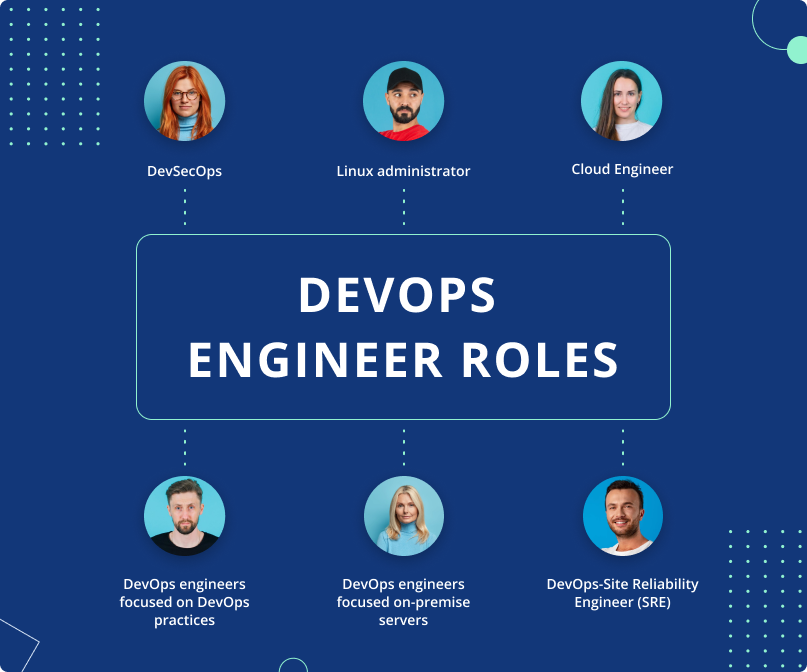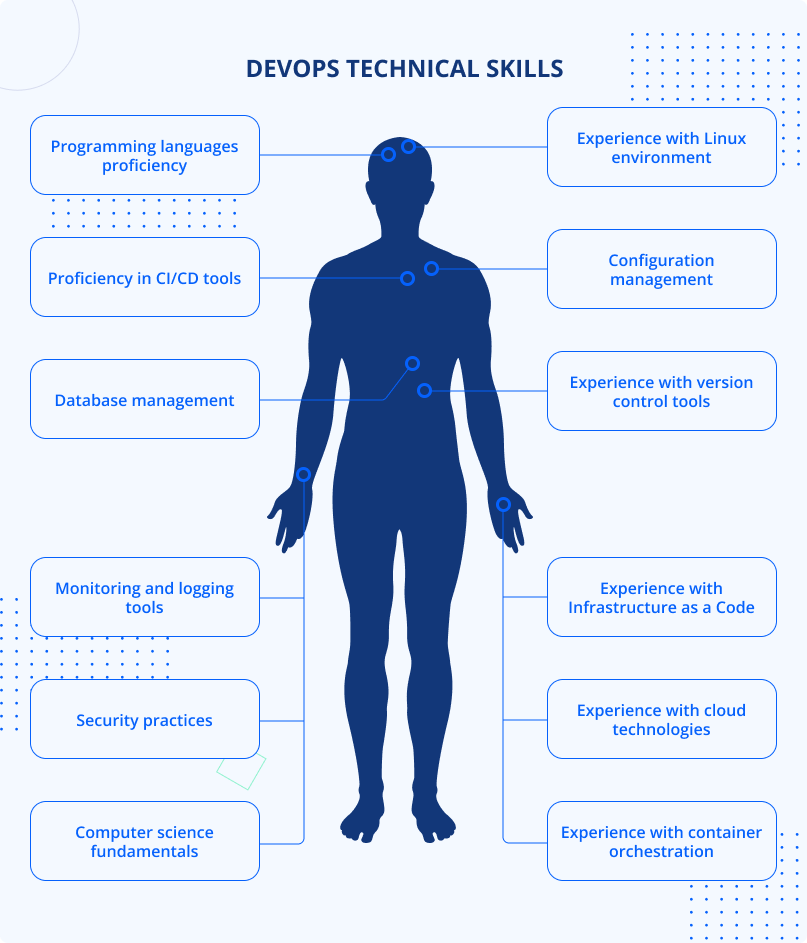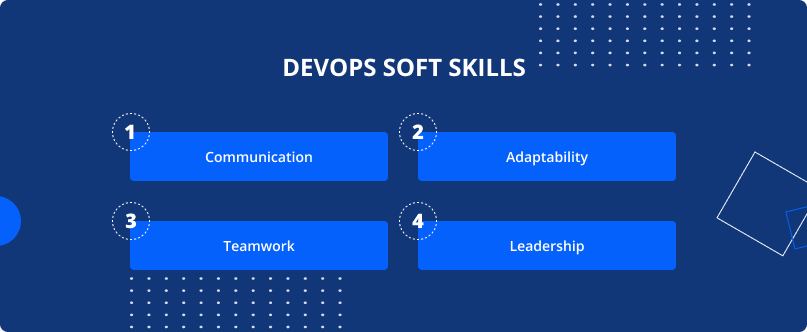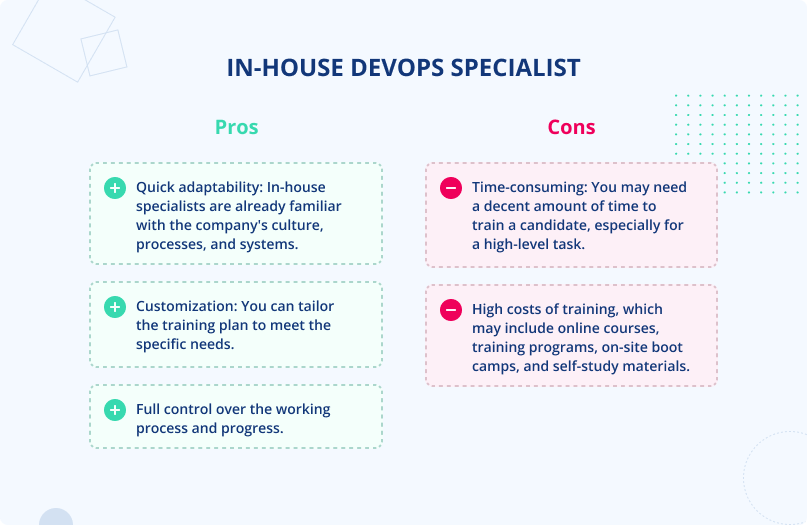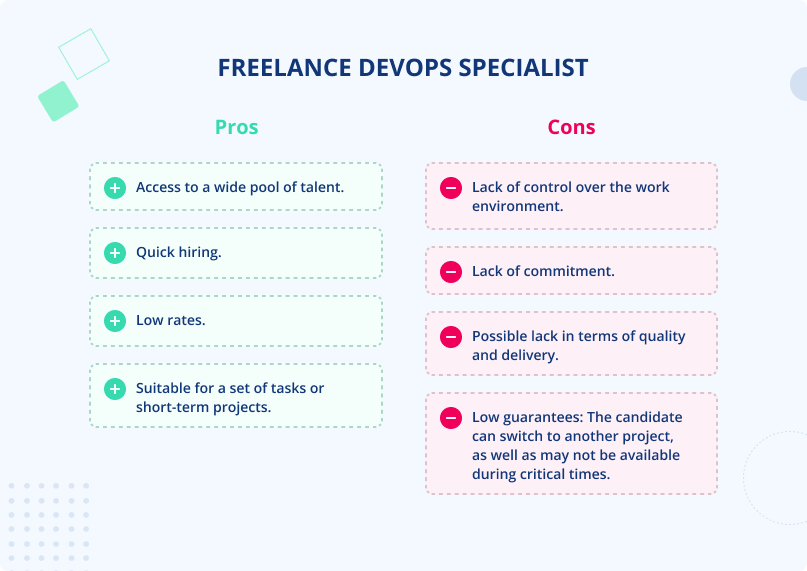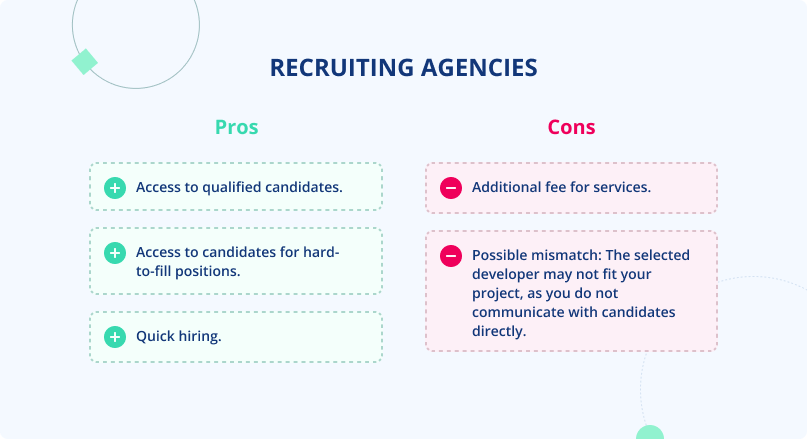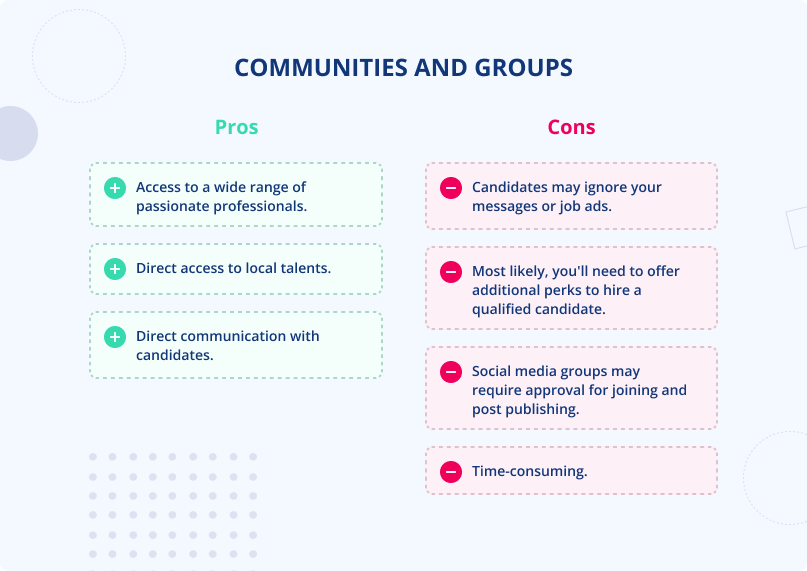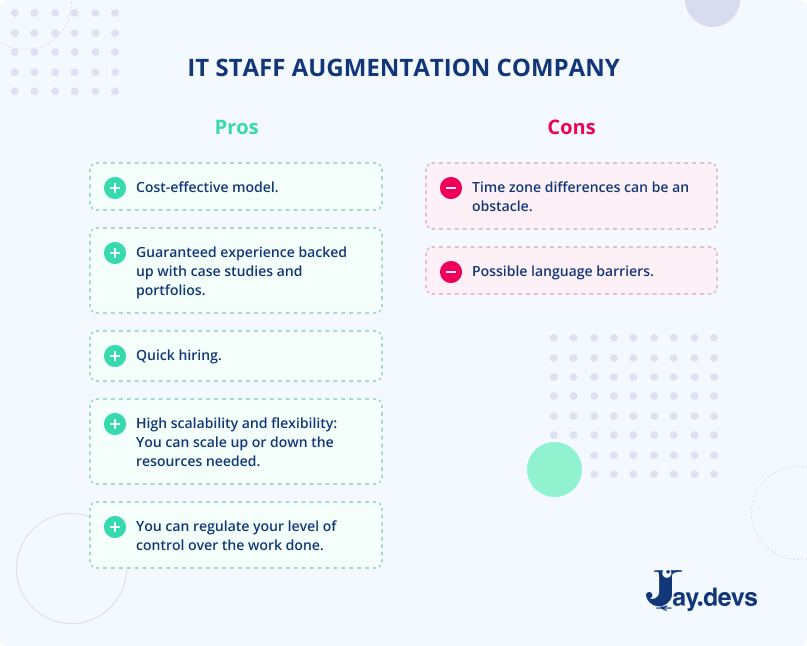Looking to speed up your software development with the best DevOps practices? Keep your applications going fast, scalable, and secure with our DevOps engineers. Hire dedicated DevOps professionals with JayDevs for long-term benefit.
According to Glassdoor, DevOps Engineers ranked fourth in “Best Jobs in America” in 2022. And if that’s not enough to convince you, LinkedIn’s 2018 poll of the top recruited jobs placed DevOps Engineer at the top.
With the ever-evolving world of technology, it’s no surprise that organizations are in high demand for individuals who can navigate the complex intersection of programming languages, infrastructure, security, and CI/CD tools.
The DevOps field is continuously evolving and gaining traction in the IT industry, making the hiring process for DevOps engineers a bit of a challenge. Hence, this article will provide you with insight into some of the interesting facts about how to hire a DevOps engineer. We will walk you through the variety of responsibilities, skills, and roles of DevOps developers. By understanding what a DevOps specialist does, you will be better equipped to identify the right candidate for your business needs.
- 1. Why Is It So Hard to Hire a DevOps Engineer?
- 2. What Are DevOps Engineers?
- 3. Why Hire a DevOps Engineer?
- 4. What Does a DevOps Engineer Do?
- 5. DevOps Engineer Responsibilities
- 6. DevOps Engineer Roles
- 7. DevOps Engineer Skills Overview
- 8. How to Identify a Good DevOps Engineer Using a CV
- 9. Interview Questions for DevOps Engineers
- 10. Where to Find a DevOps Engineer?
- 11. How Much Does It Cost to Hire a DevOps Engineer?
- Hire a DevOps Engineer with JayDevs
Why Is It So Hard to Hire a DevOps Engineer?
DevOps Engineers are one of the hardest tech jobs to hire for. This is partly because:
- DevOps is a complex role. You might hear one company describe the role as focused on automation while another prioritizes security. So, it is important to understand the specific needs and goals of your organization to determine the key skills and competencies that are essential for your DevOps Engineer.
- The skill set of DevOps specialists is constantly evolving. In the past, many DevOps engineers came from a background in system administration and operations, but the landscape has changed with the rise of cloud computing. DevOps may include skills in security management, cloud infrastructure management, and more.
- High demand, but low offer. According to Statista, DevOps was marked as the second most demanded skill worldwide in 2023. But the market still struggles with few skilled DevOps engineers out there. The DevOps Institute revealed, in their latest report, “a critical need to close DevOps skills gaps” to accelerate IT transformations.
- High salaries. The market is growing, and the competition between companies for hiring DevOps developers makes them as valuable as ever. Thus, the average salary in the US is about $123,000. While some companies can afford to hire specialists in-house and cover all costs, other companies should consider more flexible hiring models to optimize their spending in case of tight budgets.
What Are DevOps Engineers?
In this fast-paced digital landscape, companies are feeling the heat to deliver software faster and better. But wait, there’s a catch — no one wants to compromise security or reliability.
That’s where DevOps comes in, saving the day and making software delivery a dream come true. DevOps aims to bring different teams within an organization together with a common goal of delivering software with great speed and rock-solid stability without compromising on quality.
How does DevOps do it? Well, it’s all about standardization. See, in the past, developers and operations teams had different goals. Developers wanted to create as many new features as possible, while ops wanted as few changes as possible to minimize risk. This often led to delays, software delivery errors, and team friction. With DevOps, development and operations teams work together to streamline the development process and quickly resolve any issues that may arise.
DevOps is basically a way to deliver software where everyone shares the responsibility (and the pain).
The term has evolved over time, and “DevOps Engineer” has become a recognized job title. Essentially, it’s someone who understands software development to solve operations challenges and optimize the overall software life cycle.
Why Hire a DevOps Engineer?
DevOps plays a critical role in any organization looking to improve software delivery’s speed, reliability, and quality. There are different benefits to hiring a DevOps engineer; these include:
- Faster software delivery and reduced costs
DevOps engineers bring a wealth of expertise to the table when it comes to optimizing the software delivery pipeline. One of the key benefits of their skillset is the ability to automate various stages of the process, including testing. Everyone knows that product testing is time-consuming. With DevOps, a company can speed up time through automated testing. One example of automated testing is integration testing. This type of testing verifies the interactions between different components of the software, thereby ensuring that they work together seamlessly. Automating integration testing eliminates the need for manual testing, thus freeing valuable resources and reducing the time and effort required for product testing.
- Increased consistency and security
For example, immutable infrastructure is a modern DevOps practice that is becoming increasingly popular in the world of software operations. By removing the possibility of human error, immutable infrastructure ensures uniformity and consistency throughout the entire delivery process. This helps prevent configuration drift, which can occur when different servers have different configurations and software versions due to manual updates performed at different times.
Adopting an immutable infrastructure approach is a smart way to enhance the security of your IT infrastructure. This approach only involves making changes to the infrastructure through a well-defined and controlled process, such as the CI/CD pipeline. By limiting changes to the infrastructure, you can significantly reduce the risk of unauthorized access or manual changes that could compromise the security of your systems.
- Improved performance
DevOps engineers can identify performance bottlenecks and address them before they become a problem. This helps prevent issues like slow load times, crashes, and other performance problems that can negatively impact the user experience.
Monitoring and logging also provide DevOps engineers with valuable insights into how users interact with the application. This information can be used to optimize the app and make improvements to the user experience.
- Fostering innovation
With the use of tools like Terraform and Kubernetes and virtualized cloud resources, DevOps teams can quickly and easily provision new app instances in the cloud.
The ability to scale quickly and easily means that DevOps teams can experiment with new ideas and prototypes without needing significant upfront investment in infrastructure. This opens opportunities for innovation and encourages a culture of experimentation, which can lead to new products and services and new and better ways of working. This can be especially important in fast-paced industries, where staying ahead of the curve is critical to success.
What Does a DevOps Engineer Do?
The fundamental goal of a DevOps specialist is to connect all stages of software lifecycle management, spanning from coding to maintenance.
In terms of achieving this goal, DevOps participate in:
- Automating key processes such as checking the code, running tests, and deploying the updates using a combination of CI/CD and other practices.
- Setting up servers and services in the cloud.
- Monitoring and hardening system security. If your system was hacked, they are the first to spot the vulnerability and fix it immediately. They also implement disaster recovery and business continuity strategies to ensure systems remain available in case of disruption.
- Working with software developers, system administrators, an
DevOps Engineer Principal Tasks and Responsibilities
The day-to-day tasks of DevOps engineers depend on the industry and the approaches used within the company.
However, several key tasks are commonly associated with the role of DevOps.
- Continuous integration and continuous delivery (CI/CD)
Continuous integration is when all code changes are automatically built, tested, and packaged in small portions. Continuous deployment allows the auto-delivery of these changes to production environments, such as development, staging, and production.
A DevOps developer is responsible for setting up and configuring CI/CD tools. They also continuously monitor the performance of the CI/CD pipeline, ensuring that all processes and tools work together and make improvements as needed. - Infrastructure management
The IT infrastructure includes a variety of resources such as servers, databases, networks, IPs, and more. DevOps professionals plan, create and manage these resources in the cloud. They have deep expertise in cloud platforms and are responsible for managing cloud infrastructure. - Configuration management
Ensuring consistency in the configuration of your entire IT infrastructure is crucial for effective operations. For instance, if your application runs across multiple servers, it’s imperative to have uniform configurations across them. DevOps plays a vital role in automating this process, thereby streamlining operations and reducing manual errors. - Security management
DevOps specialists implement and harden security by using a combination of tools, processes, and best practices. For example, they implement multi-factor authentication to add an extra layer of protection and security incident and event management to detect, investigate, and respond to security incidents. - Coding and scripting
Automation goes nowhere without scripting. DevOps professionals usually are responsible for writing shell scripts to manage repetitive tasks such as testing or deploying. Additionally, DevOps specialists work on code reviews and updates. - Containers orchestration & microservices
Containers and microservices are widely used now to deploy applications. These technologies allow breaking the app into smaller parts, while also developing and updating them separately. - Troubleshooting
DevOps specialists constantly monitor systems and applications and identify and resolve any issues during the software development and deployment process.
DevOps Engineer Roles
DevOps is a customizable approach that varies from organization to organization, as each has unique requirements and perspectives.
A DevOps professional can fulfill different responsibilities within a business context, catering to the specific demands and objectives of the organization. If you need a narrow-focused specialist, you can look for a professional specializing in a specific area:
Cloud engineer or CloudOps
If you’re looking to adopt cloud technologies, migrate your system to the cloud, or maintain your current cloud application, you should consider hiring cloud engineers. These specialists design, implement and sustain cloud-based infrastructure and services such as AWS, Google Cloud Platform, or Azure.
DevSecOps
DevSecOps is usually a DevOps developer with a strong focus on security tasks. The difference is that the “classic” DevOps approach addresses the security issues after development, while a DevSecOps specialist integrates security best practices at each step of the software development life cycle. In addition, they automate security processes and conduct risk assessments and threat modeling.
Linux administrator
If you have a Linux-based system and infrastructure but lack a specialist who could manage and maintain it, consider hiring a Linux administrator. Such a developer is responsible for managing servers, storage systems, and network devices that run on Linux. They conduct tasks such as installing and configuring software, managing user accounts, monitoring system performance, and troubleshooting issues.
Site Reliability Engineer (SRE)
If you have a complex system to develop and do not want to face challenges like frequent system downtimes or low SRE specialists deal with production failures and infrastructure issues. They implement DevOps practices to reduce incidents, improve reliability, conduct root cause analysis, and provide the development team with constant feedback on performance metrics.
DevOps Engineer Skills Overview
DevOps developers have a diverse skill set. But before we dive in, let’s keep in mind that everyone’s needs are unique, and this list is just a starting point. In other words, think of this as a flexible guide that presents a spectrum of skills to consider.
DevOps technical skills
As DevOps professionals merge the tasks of software developers and operations, the role requires a huge amount of technical knowledge.
Programming languages proficiency
The candidate should be fluent in at least one of the following languages: Python, Java, Bash, Go, Ruby, or Pearl — however, Python, Java, and Bash are the most applied ones.
Experience with Linux environment
Proficiency in Linux is essential, as it is a key operating system for servers. The perfect candidate should have at least two years of practical experience.
Proficiency in CI/CD tools
As CI/CD is a key component of DevOps, there is a vast choice of tools. The engineer must be proficient in at least one CI-CD tool, including GitLab, Jenkins, TravisCI, or Bamboo.
Configuration management
To automate the process, a DevOps specialist should know how to use tools like Chef or Puppet.
Database management
A DevOps developer should be proficient in managing at least one of the following: MySQL, PostgreSQL, MongoDB, or Amazon RDS.
Experience with version control tools
Working experience with the three core version control systems — Git, GitHub, and SVN — is a must.
Monitoring and logging tools
The specialist should have proficient knowledge of at least one core monitoring and logging tool: Prometheus, Grafana, Elasticsearch, Nagios, or New Relic.
Experience with Infrastructure as a Code
The candidate should know how to leverage any DevOps tools such as Terraform, Ansible, or CloudFormation. By using these IaC tools, engineers configure the infrastructure automatically.
Experience with cloud technologies
The candidate should be proficient in at least one of the most widely-used cloud platforms: AWS, Azure, Google Compute Engine. If the candidate is a master of AWS, then you should look for proficiency with Amazon EC2, S3 and Glacier.
Security practices
The candidate should know how to apply vulnerability scanners (e.g., Nessus, OpenVAS, Qualys), intrusion detection tools (e.g., Snort, Suricata), and encryption tools (e.g., OpenSSL, GPG).
Experience with container orchestration
To handle your microservices architecture and manage containers like a pro, the developer should have a proven track record in Docker, Kubernetes, and Amazon ECS.
Computer science fundamentals
A deep understanding of computer science is not strictly necessary, but a basic understanding of algorithms and data structures will be extremely helpful. It is key to understanding the performance characteristics of an application.
DevOps soft skills
tIn general, the DevOps culture is based on improved team cooperation. When you hire a DevOps engineer, do not forget to check the soft skills required for effective collaboration.
Communication
The ability to effectively communicate with development and operations teams, as well as with stakeholders and customers, is essential for DevOps. They should be able to explain technical concepts clearly and concisely.
Adaptability
It’s difficult to imagine a good DevOps professional unable to work with Agile. Therefore, they should adapt to changing requirements and technologies and be open to new ideas and approaches.
Teamwork
The best DevOps engineers are surely team players. They work effectively in a team environment and collaborate with each member.
Leadership
DevOps specialists often lead teams. To do this properly, they should set directions and goals, inspire and motivate others, and manage and coordinate the work of different teams.
How to Identify a Good DevOps Engineer Using a CV/Resume
Before the first tech or screening interview, you should narrow the list to top candidates.
While scanning through the resumes, look for the following characteristics:
- Technical and soft skills described above. Proficiency in technical skills is crucial for assessing a specialist’s ability to handle tasks relevant to your requirements. Soft skills, on the other hand, reflect the candidate’s aptitude for adjusting to the work environment and engaging collaboratively within a team.
- Key highlights of previous assignments the candidate has contributed to. This offers a glimpse into their expertise across diverse domains.
- DevOps-related certificates. This will help you understand the level of expertise and commitment to the field. It could be certifications like AWS Certified DevOps Engineer, Certified Kubernetes Administrator, or Google Cloud Professional DevOps Engineer.
- Educational background in computer science, software engineering, or a related field. A bachelor’s degree in either means the candidate has a solid understanding of the underlying technology.
Good Interview Questions for DevOps Engineers
Once you’ve reviewed the CVs and selected the most suitable candidates for your project, you should conduct a live interview. This will help you ensure the specialist possesses the knowledge and qualifications stated in the resume.
We have prepared a list of possible questions divided into skills-specific sections.
Questions on infrastructure engineering:
- Can you describe your experience with network infrastructure and load balancing?
- How do you approach automating infrastructure provisioning and management?
- Describe your experience with infrastructure as code (IaC) tools such as Terraform, Ansible, and CloudFormation.
- Can you describe your experience with monitoring and logging tools like Prometheus and Elasticsearch?
- How do you ensure that your infrastructure is scalable, reliable, and secure?
Questions on CI/CD skills:
- What is the difference between continuous integration, delivery, and deployment?
- What tools do you use for continuous integration and continuous deployment?
- Explain the concept of branching in Git.
- What is the Blue/Green deployment pattern?
- How do you measure the effectiveness and efficiency of your CI/CD pipeline?
Questions on cloud fundamentals:
- Share your experience with cloud-based infrastructure and services, such as AWS, Azure, or GCP.
- How do you set up and manage storage on AWS S3, Azure Blob Storage, or Google Cloud Storage?
- How do you configure and manage auto-scaling on AWS, Azure, or Google Cloud?
- How do you use Terraform for infrastructure as code across multiple cloud platforms?
- How do you migrate an application or service from on-premises to a cloud-based environment or from one cloud provider to another?
Questions on basic programming skills:
- What is your experience with programming languages like Python, Java, Ruby, or others?
- How to use Bash, PowerShell, or Perl for automation tasks?
- Can you describe your experience with debugging and troubleshooting code?
- How do you handle dependencies and version conflicts in your code?
- Can you describe your experience with containerization and how you use it in your development process?
Questions on fundamental testing skills:
- What is the difference between unit, integration, and acceptance testing?
- What is continuous testing?
- Can you describe your experience with testing frameworks such as JUnit, TestNG, or pytest?
Questions on container orchestration:
- Can you explain the concept of a pod and its role in Kubernetes?
- What is a Docker container? What is a Docker image?
- Can you walk me through a recent project you have worked on that involved container orchestration?
Questions on security & compliance:
- How do you monitor and detect security threats to your infrastructure?
- How do you implement access controls and authentication mechanisms?
- What is the “shift left to reduce failure” concept?
- Can you describe your experience with security and compliance regulations such as SOC2, HIPAA, and NIST?
In addition to tech questions, it would be a good idea to ask behavioral questions during the interview. For example, you can ask about collaboration with software developers or task prioritization. This will help you put together a picture of professional attitudes and work habits.
Where to Find a DevOps Engineer?
Although the DevOps talent pool is limited, there are at least five different methods to hire a DevOps engineer successfully. Each method is associated with individual peculiarities.
Growing an in-house specialist
As the DevOps role is between software development and IT operations, you can look for a suitable candidate within your in-house developers or operations teams.
Keep in mind the three core pillars the specialists should be acquainted with: OS administration, programming language, and public cloud.
For example, software developers could be a great option since they specialize in at least one programming language and have an engineering background. An ideal candidate could be a developer familiar with the basics of Linux administration, Python, and the AWS cloud platform.
IT operations specialists are often ideal candidates as they have experience in vital DevOps aspects, such as working with infrastructure, server management, system monitoring, and incident management.
Hiring a freelance DevOps developer
Freelance engineers are independent specialists who offer their DevOps services on platforms like Upwork, Fiverr, or Freelancer.
To hire a freelance DevOps engineer, you need to create an account on the platform and post a job with information about required skills and deliverables. After that, you can expect proposal submissions from candidates. You can also browse profiles, filter them by different rates and skills, and reach out to appropriate candidates directly.
Working with talent tech recruiting companies
Reaching out to tech recruiting companies is another widely used model when it comes to hiring a DevOps engineer. It is a suitable option when you lack in-house recruitment capacity but must quickly fill the position with a specific and reliable candidate.
After you reach out to a company, you provide them with comprehensive information on positions you need to fill and detailed job descriptions, including specific skills and experience required.
Hiring a DevOps engineer through communities and groups
Another option for hiring a DevOps engineer is to connect with potential candidates in DevOps communities and groups.
For example, you can leverage online groups on LinkedIn, DevOps community platforms, or Facebook groups related to DevOps. In addition, you can consider joining local meetups if you are interested in local talent acquisition.
You can post a job if a group or community platform allows such an opportunity or reach out to potential candidates directly and invite them to apply for the position.
Communities and groups often consist of real “geeks” open to new opportunities. Despite the model being rather time-consuming, it allows you to connect with candidates who are passionate about the field.
Hiring DevOps engineers through IT staff augmentation company
The final option to hire a DevOps engineer is engaging an IT staff augmentation company.
This model is cheaper than traditional in-house hiring but provides you with the same reliability. With staff augmentation, you enlist pre-screened and qualified professionals to assist with your operational needs, seamlessly integrating them into your team on a contractual basis.
All you need is to reach out to a company and specify candidate requirements. Once completed, the company will provide you with a shortlist of vetted candidates who are available for the project.
IT staff augmentation is probably the most flexible model for hiring DevOps talent. It reduces the time and cost of recruitment processes while keeping a high quality of work.
How Much Does It Cost to Hire a DevOps Engineer?
The cost of hiring DevOps specialists may vary significantly depending on the region.
The USA-based DevOps specialist makes approximately $123,000 a year, according to Glassdor. In Canada, DevOps specialists can command around $97,000 a year.
Eastern and Northern Europe are often considered the most beneficial regions for hiring DevOps engineers. This is because the average cost for IT talent there is usually lower in comparison to North America or Western Europe. For example, in Lithuania, the average salary for a DevOps developer is about $51,000 per annum. This could be a great hiring opportunity, considering European engineers’ high-quality services.
Another important factor to reflect the salaries of specialists is their qualifications. For example, an entry-level DevOps developer in the US will cost you around $79,000 a year, while a senior-level engineer with 8+ years of experience will most likely cost more than $140,000 a year.
We searched for information on platforms like Salraryexpert, Glassdoor, and Pay Scale and wrapped up the data on average yearly salary depending on the level of seniority. Listed below are approximations so you can keep them in mind when searching for DevOps engineers to suit your budget.
Why Choose JayDevs to Hire a DevOps Engineer?
What do we do?
JayDevs is a reliable staff augmentation company augmenting development teams worldwide with the best engineering talent. With JayDevs, you can hire DevOps engineers who’ll be ready to join your project within a week. We also provide DevOps consulting services, gap analysis, and other in-demand services to help you establish DevOps processes.
At JayDevs, we specialize in offering comprehensive IT staff augmentation and talent tech recruitment services tailored to meet the diverse needs of businesses across various industries. Our IT staff augmentation solutions provide businesses with the flexibility to enhance their teams’ capabilities without committing to long-term hiring obligations. Whether you require additional support for short-term tasks or ongoing assistance, our skilled professionals are equipped to seamlessly integrate into your existing workforce.
In addition to our IT staff augmentation services, we excel in talent tech recruitment, assisting businesses in identifying and hiring top-tier talent suited to their unique requirements. Leveraging our extensive network of professionals and robust vetting processes, we match you with candidates who possess the necessary skills, experience, and cultural alignment to thrive within your organization.
Background and reputation checks
We match you with only the best talent, ensuring they have positive professional backgrounds and strong references from previous employers.
English test
Each developer goes through an English assessment. We aim at candidates with a B2+ level to eliminate any possible language barrier.
Proficiency test
Our engineers prove their proficiency by stating it in their CVs and with multi-step technical tests and AWS certifications.
Live interview
If you are ready to hire a DevOps developer, you are just one step away from hiring an ideal candidate. Contact us, and we will arrange a live interview with the best-fit candidates.
How much does it cost?
We specialize in offering senior and lead developers. With JayDevs, you can hire a DevOps engineer starting at rates ranging between $49 and $54 per hour through our IT staff augmentation services. Alternatively, with our talent tech recruitment Pay-Per-Hire pricing model, there are no upfront charges. You’ll only incur fees upon successful candidate placement, where clients pay a candidate’s monthly salary (gross).






